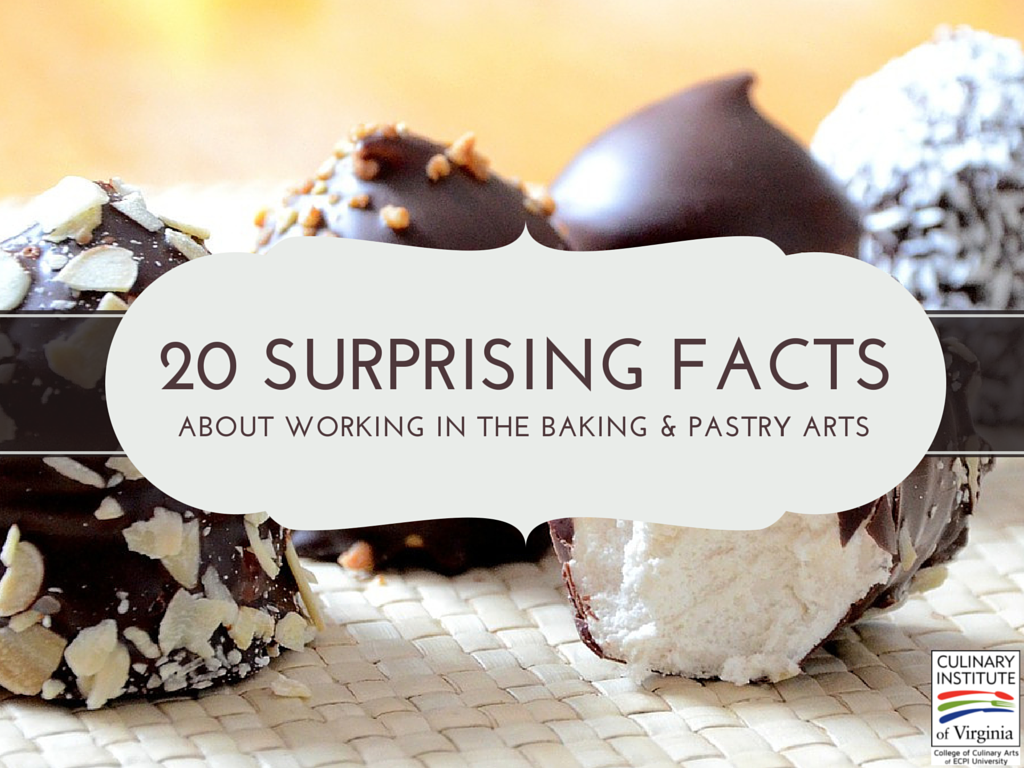
According to the American Baker’s Association, the baking industry accounts for 2.1 percent of the country’s GDP or roughly $311 billion.
Intrigued? Here are 20 more surprising facts about a career in baking and pastry arts:
Baking and Pastry Arts Students Share Certain Traits
20. They have creative minds, value discovery and love making something unique they can share.
19. They strive for perfection, which is important given that precision in this field often leads to the best results.
18. They have patience or work hard to achieve great results, which is also critical since baked goods can take hours to create.
17. They accept failures without losing motivation or passion. A single mistake by a baker or pastry chef can result in the complete loss of the product.
16. They are open to learning new things and learning from their mistakes.
Bakers and Pastry Chefs Enjoy a Wide Range of Opportunities
15. Places of employment go beyond restaurants, bakeries and patisseries. Grocery stores, commercial baking sites, corporations, hotels, schools, and catering firms also hire bakers and pastry chefs.
14. Industries that see the highest employment are restaurants and other eating establishments, traveler accommodations, special food services, specialty food stores, amusement and recreation destinations, grocery stores, bakeries, and tortilla manufacturing.
13. The top industries for chefs and head cooks are deep sea, coastal and Great Lakes water transportation, local and state government, traveler accommodation, professional, technical and trade schools, the federal executive branch, management, scientific and technical consulting, real estate and scientific research and development services.
12. Beyond creating scrumptious baked goods as employees, bakers and pastry chefs also do the same as business owners. Additionally, they can make a name for themselves as food critics, educators, bloggers and vloggers, TV/Web personalities, industry experts, and consultants.
11. Many travel the world by working in kitchens on cruise ships and other forms of transport. Some explore other countries on their own to learn about baking and pastry art traditions in foreign lands and then write about their experiences in travel guides, magazines and/or travel and cook books.
Work as a Baker or Pastry Chef Isn't Easy
10. Bakers and pastry chefs often work long schedules with early mornings, late nights, and holidays.
9. They spend a lot of time preparing and combining ingredients, as well as monitoring baking processes; applying icings, other toppings and decorations; and storing, transporting and/or presenting/displaying their works.
8. Many handle business tasks such as dealing directly with clients and vendors; hiring/firing employees; and purchasing ingredients, equipment, display cases, marketing materials and other items.
Acquiring the Right Education Doesn’t Take Long
7. ECPI University's Baking and Pastry Arts Diploma takes only 40 weeks to earn. ECPI University matches students’ needs with small, intimate classes and flexible day, night, and online schedules.
6. Students achieve 38 semester credit hours, which they can apply to the pursuit of an associate’s degree in Culinary Arts in approximately 1.5 years.
Students Learn More Than Measuring and Mixing
5. Award-winning chefs help students learn preparation, baking and pastry techniques, recipe development, kitchen organization, equipment use, special dietary accommodation techniques, health and safety rules/procedures, teamwork, and even menu design.
4. Students can learn to create a wide variety of baked goods including artisan breads, sweet doughs, laminated pastries, petit fours, multi-layer tiered cakes, crèmes, frozen desserts and custards; as well as how to decorate these items with sugar, chocolate, pastillage, piping, icing, torting, and more.
3. Students can also learn proper handling and transportation methods including plating, tableside cooking, food setup and buffet presentation, and sanitation procedures required when dealing with the creation and transport of baked goods.
2. Business lessons can make it possible for them to handle operating a kitchen, business, or manufacturing setting.
1. Students can gain real world experience through an externship that they can acquire with the assistance of ECPI University’s Career Service Department.
ECPI University can help you get started as a baker or pastry chef! Get in touch TODAY to learn more about how you could earn a diploma in Baking and Pastry Arts in as little as 40 weeks with the Culinary Institute of Virginia’s year-round scheduling. It could be the Best Decision You Ever Make!
DISCLAIMER – ECPI University makes no claim, warranty or guarantee as to actual employability or earning potential to current, past or future students or graduates of any educational program we offer. The ECPI University website is published for informational purposes only. Every effort is made to ensure the accuracy of information contained on the ECPI.edu domain; however, no warranty of accuracy is made. No contractual rights, either expressed or implied, are created by its content.
For more information about ECPI University or any of our programs click here: http://www.ecpi.edu/ or http://ow.ly/Ca1ya.


